Constituent Assembly of India Debates
Constituent Assembly of India Debates
Constituent Assembly of India Debates
Create successful ePaper yourself
Turn your PDF publications into a flip-book with our unique Google optimized e-Paper software.
are still five minutes left.<br />
Shri K. Santhanam: Mr. President, I do not want to go into any details <strong>of</strong> the<br />
distribution <strong>of</strong> powers as presented to us by the Union Powers Committee. I will have<br />
my own say on each item when it comes up for discussion, but there are certain<br />
general considerations which we have to keep in mind when we come to the<br />
discussions <strong>of</strong> these items. It is a great pity that our politics have been subject to<br />
violent oscillations during the last six months with the result that the minds <strong>of</strong> our own<br />
leaders also have had to go from one extreme to the other. In the Cabinet Mission<br />
Plan the idea was that the Units should be absolutely autonomous and even sovereign,<br />
and that they should surrender a small modicum <strong>of</strong> power to the Centre. Of course,<br />
there was the complication <strong>of</strong> the Group Constitution, and the whole thing was left<br />
vague but so far as the Central Government was concerned it was to have very limited<br />
powers. And some <strong>of</strong> our leaders were put on a Committee to define those powers and<br />
they tried their best to stretch these powers to their maximum. I doubt, if the Cabinet<br />
Mission's Scheme had come into operation, whether that stretching would have stood<br />
any real scrutiny. But the position was suddenly altered by the June 3rd plan and the<br />
resulting Independence Act. Now the position is we have got almost a unitary Centre<br />
which is trying to hand over certain powers to the Provinces and the whole plan <strong>of</strong> the<br />
Union Powers Committee is based on that procedure. They have tried to take the<br />
Government <strong>of</strong> <strong>India</strong> Act as their basis and considered what items can be transferred<br />
from the Provincial List to the concurrent list and Provincial list to the Federal list. I am<br />
afraid they have made a wrong approach to this problem. I too am anxious to have a<br />
strong Government for this country but my conception <strong>of</strong> strength <strong>of</strong> Centre is rather<br />
different from that embodied in the Union Powers Committee Report. I do not want<br />
that the Central Government should be made responsible for everything. The initial<br />
responsibility for the well-being <strong>of</strong> the people <strong>of</strong> the provinces should rest with the<br />
Provincial Governments. It is only in strictly all-<strong>India</strong> matters that the Central<br />
Government should have responsibility and should come into play. Therefore, the<br />
strength <strong>of</strong> a Centre consists not only in adequate powers in all-<strong>India</strong> subjects but<br />
freedom from responsibility for those subjects which are not germane to all-<strong>India</strong> but<br />
which really should be in the Provincial field. It is in this positive as well as negative<br />
delimitation <strong>of</strong> powers that a real federal system rests and I think the federal powers<br />
as defined by the Committee report err on the wrong side. It tries to burden the<br />
Centre with all kinds <strong>of</strong> powers which it ought not to have. Take for instance,<br />
vagrancy. I cannot understand why 'vagrancy' has been taken away from the<br />
Provincial list and put in the concurrent list. Do you want all <strong>India</strong> to be bothered<br />
about, vagrants? There is almost an obsession that by adding all kinds <strong>of</strong> powers, to<br />
the Centre, we can make it strong. There is another subject. Sir, called "economic<br />
planning" which is put in the concurrent list. Now, I know that planning is the most<br />
important pre-occupation <strong>of</strong> the Central and Provincial Governments and that we must<br />
make some attempt to co-ordinate Central and Provincial policy, but is this the proper<br />
way to make it concurrent, so that the Centre can assume any power and can prevent<br />
any unit from planning in its own way even in the filed <strong>of</strong> provincial subjects, even in<br />
agriculture? Even the matter <strong>of</strong> dairies, the Centre can pass bill and take powers to<br />
itself in its own discretion. I say this should have been dealt with as a separate part <strong>of</strong><br />
the Union Constitution, as to what powers <strong>of</strong> planning the Provincial Government<br />
should have and how these powers should be coordinated by consultation and<br />
consent, and not by simply saying that we have this all important Planning as one <strong>of</strong><br />
the items in the concurrent list.<br />
Then, take the financial distribution. They have put all taxation except land<br />
revenue and one or two other diminishing items, like excise on intoxicating liquors, in


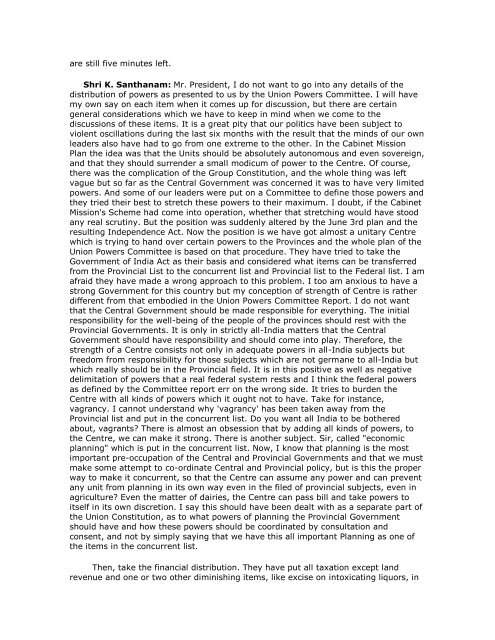
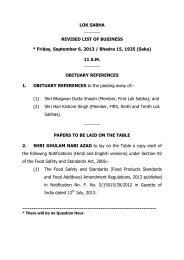
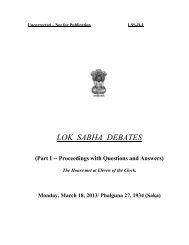
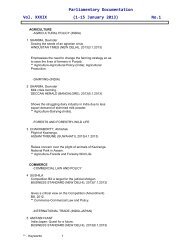
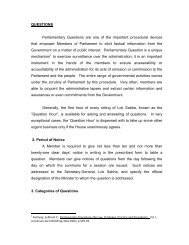
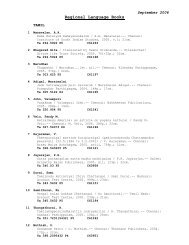
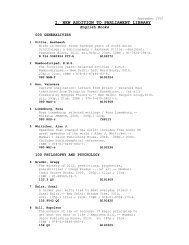

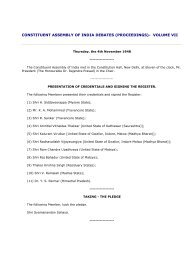
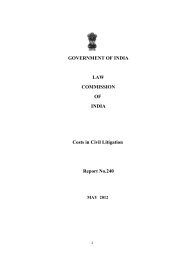
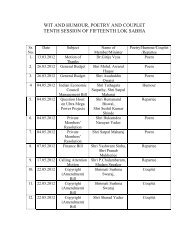
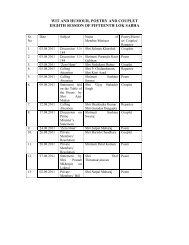

![gÉÉŌ A.]ÉŌ. xÉÉxÉÉ](https://img.yumpu.com/8015720/1/190x245/geeo-aeo-xeexee.jpg?quality=85)
